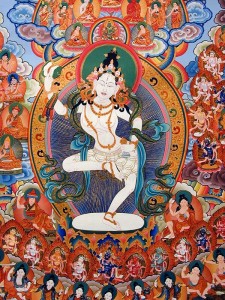The following is respectfully quoted from “Reborn in the West” by Vicki Mackenzie as she recounts Jetsunma’s life story. This section begins as Jetsunma describes her early practice:
‘I left the party at that point,’ was how she put it. ‘I felt “There’s nothing here.”‘ Her meditation then took a quantum leap–right to the heart of mysticism, to the fount of truth.
‘In my next dream I was guided to meditate on the question “If what I have here does not amount to much because it is so finite, then what is there of value?”‘ Suddenly she found herself contemplating absolute reality, or ultimate truth, the primordial wisdom state and the most profound and difficult subject of all Buddhist meditations.
‘I didn’t have the words for it but I knew it wasn’t like God, the old-man-on-the-throne idea. What I was meditating on was a non-dual, all-pervasive essence–that is, form and formless, united, indistinguishable from one another. I saw that it was the only validity–that and the compassionate activity that was an expression of it.’
What Jetsunma was telling me was, I recognized, quite exceptional. What yogis and scholars in Tibetan monasteries take years to achieve after long intellectual delving and even longer years of retreat, Jetsunma had arrived at entirely of her own accord. Tucked away on her farm in North Carolina without any guru, any book, any established doctrine or example to follow, she had not only discovered but realized the two essential truths–wisdom and compassion, the two wings of Tibetan Buddhism that are said to fly you all the way to Enlightenment. Without them you can barely get off the ground. It was an amazing feat.
But she didn’t stop there. While she continued to meditate on absolute nature and compassion she simultaneously began to offer up her body, part by part.
‘This is going to sound strange,’ she said, laughing, ‘but I would lie down–I didn’t know you were suppose to do all of this sitting up–and I would look down at my feet and say, “OK, here they are, ten toes.” And I would really look at my feet and consider all the things that my feet could do for me. And then I would contemplate what was the ultimate good of these things–no ultimate use at all!” ‘ She would continue in that vein throughout her body, staying longer on the parts she felt attached to. ‘No one wants to give up their head, for instance. Our head is like the last bastion of our individuality. And I’d pay special attention to my female parts and my hands. You don’t want to do without them!’
She didn’t know it then, but what she was doing was no less than Chöd, another profound Tibetan meditation whereby you relinquish your body to emptiness for the good of all. It is considered the ultimate physical surrender. How she had come across such a strange meditation in the middle of North Carolina, with only a baby and husband for company, adds to the mystery. I asked again, to make sure, if there were any outside influences that could have been directing her.
‘We were in Ashville in the seventies and nothing metaphysical was happening there,’ she replied. ‘Actually there was one thing–a small transcendental meditation centre had started and friends kept urging me to join. But I resisted. It didn’t feel as though it was the right place for me. They said I had to have a guru, that I couldn’t get anywhere without one, and I replied, “That may be true, but I haven’t found my teacher yet and I will know when I do.” ‘
She continued these intense periods of individual meditation over several years. ‘I would meditate for hours at a time. Luckily I had a baby who was peaceful and slept a lot, and a husband who was supportive of what I was doing. I am eternally grateful for that. But it was still a householder’s retreat. I had a husband, a child and all the chores to do. Even so, I had a much stricter schedule of meditation than I do now.’
The meditations grew in strength and clarity, and when she was around thirty she had a spiritual experience which showed that the time to begin her work had begun. She was reluctant to tell me about it, except to say that she entered a long period of meditation from which she emerged knowing that her personal life had finished and that she had been born solely to be of benefit for others. ‘I never said anything to anyone about it. But oddly, after that people started coming to me.’
